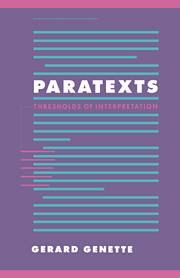Book contents
- Frontmatter
- Contents
- Foreword
- List of books by Gérard Genette
- Translator's note
- 1 Introduction
- 2 The publisher's peritext
- 3 The name of the author
- 4 Titles
- 5 The please-insert
- 6 Dedications and inscriptions
- 7 Epigraphs
- 8 The prefatorial situation of communication
- 9 The functions of the original preface
- 10 Other prefaces, other functions
- 11 Intertitles
- 12 Notes
- 13 The public epitext
- 14 The private epitext
- 15 Conclusion
- Additional references
- Index
11 - Intertitles
Published online by Cambridge University Press: 04 November 2009
- Frontmatter
- Contents
- Foreword
- List of books by Gérard Genette
- Translator's note
- 1 Introduction
- 2 The publisher's peritext
- 3 The name of the author
- 4 Titles
- 5 The please-insert
- 6 Dedications and inscriptions
- 7 Epigraphs
- 8 The prefatorial situation of communication
- 9 The functions of the original preface
- 10 Other prefaces, other functions
- 11 Intertitles
- 12 Notes
- 13 The public epitext
- 14 The private epitext
- 15 Conclusion
- Additional references
- Index
Summary
Intertitles, or internal titles, are titles, and as such they invite the same kinds of remarks I made earlier, which I will avoid systematically repeating but will allude to now and then. And inasmuch as they are internal to the text or at least to the book, they invite other kinds of remarks, to which I will devote more attention.
First and most obviously: in contrast to general titles, which are addressed to the public as a whole and may have currency well beyond the circle of readers, internal titles are accessible to hardly anyone except readers, or at least the already limited public of browsers and readers of tables of contents; and a good many internal titles make sense only to an addressee who is already involved in reading the text, for these internal titles presume familiarity with everything that has preceded. For example, the title of the thirty-seventh chapter of Les Trois Mousquetaires is “Milady's Secret,” and this name, or nickname, obviously sends the reader back to a previous encounter with the character who bears it.
The second and more important remark stems from the fact that, in contrast to the general title (which is a paratextual element that has become indispensable, if not to the material existence of the text then at least to the social existence of the book), intertitles are by no means absolutely required. Their potential presence extends from impossible to indispensable, and here we should quickly run through these different degrees.
- Type
- Chapter
- Information
- ParatextsThresholds of Interpretation, pp. 294 - 318Publisher: Cambridge University PressPrint publication year: 1997



